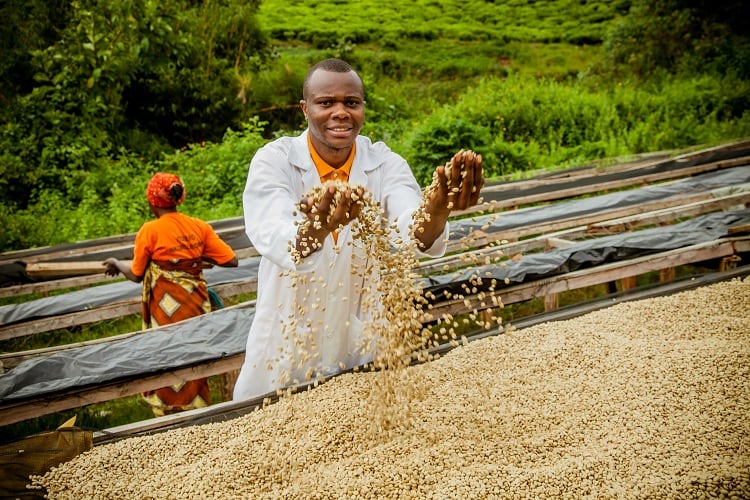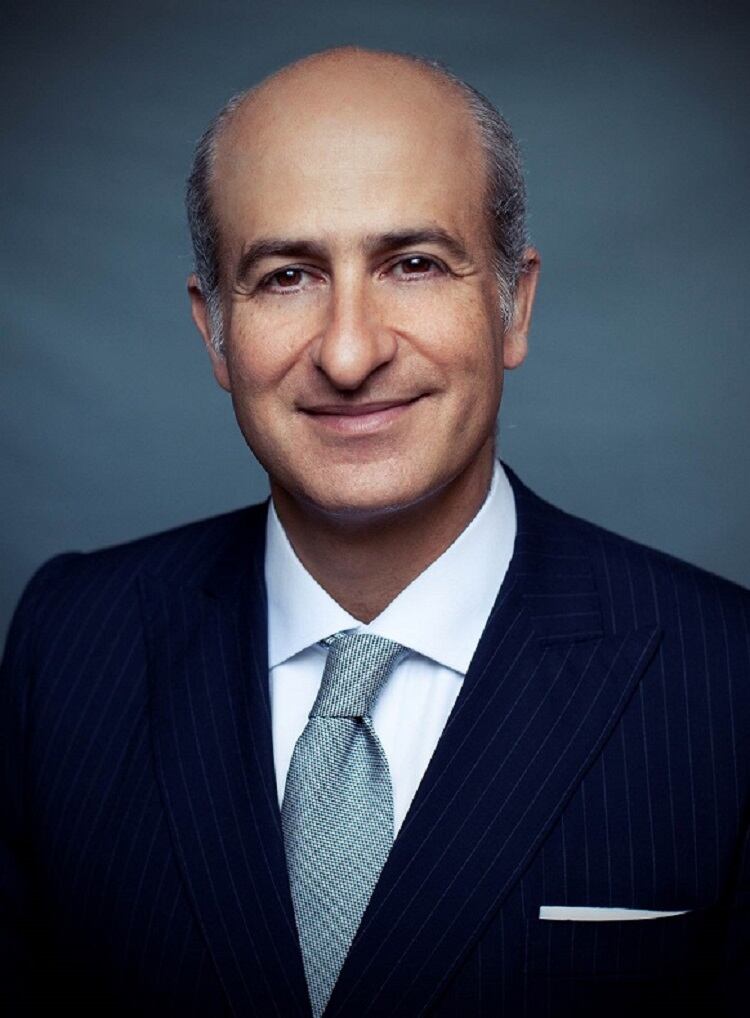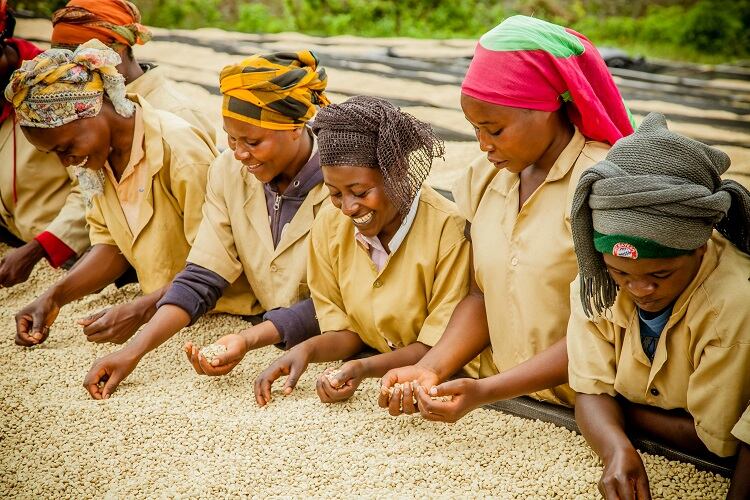Swiss coffee merchant Sucafina was founded in 1977 in Geneva. More than 40 years on, CEO Nicolas Tamari – son of founder Abdallah – employs 900 people across more than 20 locations, and boasts a coffee sourcing network made up of 15 producing countries.
The company is first-and-foremost a green coffee supplier. However, Sucafina can and does roast for some clients under its white label roasting business. “We are happy to be a roaster, but not a brand owner,” said Tamari. “If we were to become a brand owner, we would be competing with our customers.”
Which is fair reasoning, given his client list features big coffee players such as Starbucks, Nestlé, Nespresso, Jacobs Douwe Egberts (JDE), Lavazza, and Illy.
Ultimately, Sucafina’s vision is to be the leading sustainable ‘farm to roaster’ coffee company in the world, Tamari told FoodNavigator at the Embassy of Switzerland’s ‘Future of Coffee’ event in London.
“Sustainability has three pillars: the first is economic sustainability, the second is social sustainability, and the third is environmental sustainability,” he elaborated.
“Too few people talk about economic sustainability, but for me it is very important that everyone in the supply chain – the farmer, the merchant or the roaster – adds value and make a living out of the business.”
So how can economic sustainability be ensured across the entire coffee supply chain, including its multitude of smallholder farmers? According to Tamari, the answer lies in three elements: traceability, transparency, and operational efficiency.
Traceability, transparency, and operational efficiency
Traceability is a challenge where smallholder farmers are concerned. And in East Africa alone, Sucafina deals directly with approximately 200,000 of them. This makes for a ‘fragmented’ network, Tamari explained.
“When we talk about smallholders we are talking about people who have a yearly coffee income of about US$1,000 per year. So we are talking about very small coffee producers.” Sucafina deals directly with producers via on-the-ground operations in countries including Brazil, Colombia, Ethiopia, Uganda, Rwanda, Burundi, Kenya, Tanzania, Indonesia, Papua New Guinea, and Vietnam.
“It is very easy to trace coffee back to the specific coffee producing country. It is harder to trace it back to a coffee mill. And it is very difficult to trace it back to a washing station or to a cooperative, and then to the farmer,” we were told.

The second element, transparency, also plays a role in ensuring economic stability, the CEO explained. Today, roughly US$200-250bn-worth of coffee is sold to consumers. Yet, just 20% – US$20bn – goes to the coffee farmer, leaving the rest in the supply chain, he continued. “So it’s important to know who paid what price at which stage of the supply chain.”
Finally, operational efficiency can be lacking across multi-country and multi-stakeholder value chains. Looking at coffee, data can be entered and re-entered multiple times as the commodity works its way closer to the consumer.
“When coffee is shipped from a coffee producing country, an email is sent to the merchant. The data is entered into the merchant’s enterprise resource planning (ERP) software, and the email is forwarded to the roaster. That same data is then entered into the roaster’s ERP – which makes for a lot of double data entry,” Tamari explained.
Blockchain in coffee
This is where blockchain comes in: “If you have a distributed ledger, you enter the data once, and everybody [with authorisation] can see it.”
Last month Sucafina announced a tie-up with tech start-up Swiss Famer Connect SA to bring blockchain and other technologies, via the IBM Food Trust Platform, to the coffee chain.
As well as bringing operational efficiency, transparency, and traceability (the technology successfully captured the provenance of each exported bag of coffee from Colombia and Rwanda during the pilot phase), Farmer Connect aims to link consumers to the farmers who grow their coffee.
“Today, when you pay for a cup of coffee, for which you pay £2-2.5 pounds, about 5p goes to the grower,” the CEO explained. “But if you knew where your coffee was produced, and the needs of the particular grower, you might be willing to ‘thank your farmer’ by sending him or her money directly, or to a project in his or her community.”
Projects could include the construction of a local school or an environmental initiative in the grower’s area, he elaborated. “The platform is designed to connect consumers with producers in order to give the consumer a voice in sustainability governance.”

In collaboration with IBM, Farmer Connect has developed a smartphone app to facilitate this. ‘Thank My Farmer’ allows consumers to scan a barcode – either in retail outlet or coffee store – to learn where and from who those particular beans were sourced.
The app provides a full description of the coffee they are drinking, and pulls data from the blockchain to highlight that coffee’s journey on an interactive map’. It is through this app that the consumer can then choose to thank the farmer with a donation.
By interacting with the app, consumers can also share, contribute to, and follow sustainability projects linked to their coffee by region, variety, or brand.
The platform is due to go live in 2020. Other coffee stakeholders on boarding the technology include the Colombian Coffee Growers Federation (FNC), the J.M. Smucker Company, JDE, RGC Coffee, and Beyers Koffie.
Farmer Connect SA has worked with IBM to develop an application called ‘Thank My Farmer’ that gives consumers a full description of the coffee they are drinking and pulls data from the blockchain to highlight the journey that the coffee has taken through an interactive map.
The app also allows consumers to learn about, share, contribute to and follow sustainability projects that are linked to their coffee or by region, variety, or brand.
Reinventing the role of the coffee merchant
Sucafina’s collaboration with Farmer Connect will help keep the family-owned business ‘ahead of the game’, Tamari told this publication.
“We will benefit because we are reinventing, through Farmer Connect, the role of the coffee merchant. Today, a coffee merchant is selling coffee the same way a farmer is selling coffee. Tomorrow, a farmer will be able to sell coffee and sell data. And the merchant will be able to sell coffee and data.”
This, Tamari suggested, is becoming increasingly important as smallholder farmers face price instability and low farm gate return. By adopting Farmer Connect’s platform, Sucafina will be ‘proving’ its supply chain’s transparency and traceability ‘through technology’, we were told.
According to founder and president of Farmer Connect, Dave Behrends, global coffee prices recently hit the lowest price in over a decade, which he said is forcing many to exit the industry entirely by either turning to new crops or migrating.
“If this trend continues, it will severely impact the broader supply chain, and it will likely be consumers who ultimately shoulder the burden of higher retail prices or a reduced number of coffee producing countries.
“Blockchain technology, combined with digital identity and the ability to support sustainable projects across borders, is poised to bring radical transparency, efficiently, and data-driven sustainability metrics that have the possibility to birth a new, more equitable model in one of the world’s most vital commodity markets.”




